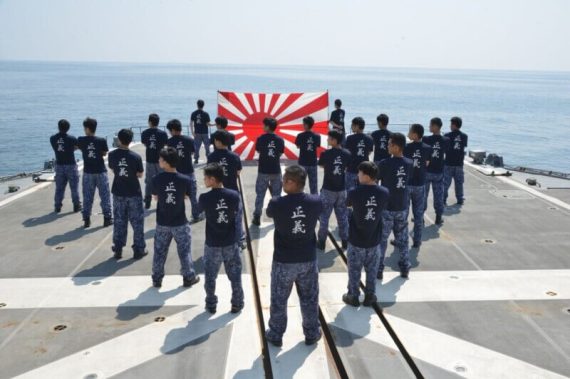T
In late December 2022, the Japanese government announced a new security policy, abandoning the fiction that the country’s military (euphemistically called the “Self Defense Forces”) would not possess offensive weaponry. Perhaps more significantly, the government also announced it would increase military spending dramatically, almost doubling the budget over the next five years.
This has been reported on internationally (and domestically) as an inevitable reaction to increasing Chinese assertiveness in the South China Sea and elsewhere. Such reporting, however, misses the broader political context.
The two percent figure: Pleasing the Americans
The Japanese government’s stated aim is to have military spending at two percent of GDP: a startling departure from the longstanding policy commitment to keep the budget at or around one percent. This would make Japan the third-largest military spender in the world, after the United States and China—an uncomfortable fact rarely mentioned in the Japanese media.
The two percent figure is an arbitrary one, not based on any kind of serious assessment of defense needs. Indeed, some commentators have argued that the military does not have the capacity to absorb the large sums: the all-volunteer forces have consistently not been able to meet their recruiting goals. Nevertheless, successive governments of the conservative Liberal Democratic Party (LDP), backed by big business, have long pushed for the increase—a push that became stronger under the overtly nationalistic cabinets of Shinzo Abe.
Rather, the reasoning is political. NATO countries, the closest allies of the United States, commit to a two percent GDP target (though not many of them fulfill this pledge, inviting American criticism). Though obviously not a NATO member, Japan increasing its military budget to two percent, would, in the minds of the political elite, endear the country to the eyes of the all-important Americans.
For Japan to be recognized as a good student and invited to the front of the classroom to sit amongst the big boys, so the political elite believe, Japan must prove its worth to the United States as a trusty military sidekick, ready to jump to action at a moment’s notice. The notion that American interests may differ from Japan’s, or that Japan may be dragged into a catastrophic war, seems simply inconceivable; for better or for worse, Japan wants to be all in.
China as Japan’s eternal boogeyman
The Russian invasion of Ukraine has, of course, provided a bandwagon for the LDP to obtain support for a larger military, and has been relentlessly exploited. However, the true adversary has always been China, labelled in the new policy as “a matter of serious concern” for Japan and the “greatest strategic challenge” the country faces.
This mantra of the Chinese threat has been repeated ad naseum in Japan for the better part of twenty years, in particular since China overtook Japan as the world’s second-largest economy in 2010. The Japanese have essentially been spoon-fed a sustained, almost hysterical barrage of how they must fear the Chinese menace.
China is a security threat, an economic threat, a political threat, a cultural threat— the list goes on and on, and is repeated over and over in official statements and in the media. Yet few can point to any plausible, concrete threat that China poses to Japan, and certainly none that would be solved by aggressive military posturing. That China poses a challenge to unipolar American hegemony in the Asia Pacific (and elsewhere) is clear, but that is a problem for Japan only because of the slavish attitude of the political elite towards the United States.
The context: Continuing Japanese decline
The background of this is, of course, ongoing Japanese decline. Since the bubble economy imploded in 1990, economic growth has been anemic at best. Wages have remained stagnant for the better part of thirty years, and the country is now in the lower third of the Organization for Economic Co-operation and Development (OECD). A recent global survey showed that salaries for information technology (IT) engineers in Japan came in at a dismal twentieth place. With the weakening yen, more and more young people are moving abroad for higher wages—a situation that would have been inconceivable a generation ago.
The low wages are particularly galling given the brutally long hours most Japanese still work: karoshi, death from overwork, remains a major social issue in the country, with people regularly working over the officially recognized “karoshi line” of 80 hours of monthly overtime. An international survey of young people in 2018 showed that Japan was dead last in terms of hope for the future: only 12 percent of Japanese respondents said they had any hope. The second lowest, France, had twice that. Forty percent of Japanese, double the percentage of 1989, are currently in precarious, contract-based employment.
Within this general context of anxiety, people often want a scapegoat, and China has served as the all-menacing boogeyman. Of course, the Japanese do not believe that China is the direct cause of the country’s economic and social decay: rather, it is the vague sense of impending doom, of being stalked, overtaken, and left in the cold by some dark, powerful force that has, over time, gripped the popular consciousness. More and more, the “Chinese threat” is being used to simply shut down any debate—something that can be observed with the military expansion.
How to finance?
It would not be an exaggeration to say that the public debate on the military budget increase has been negligible. Opinion surveys show that public sentiment is almost evenly split on the increase. However, the “debate” has been framed by the media in terms of how the new budget will be financed, with the increase itself simply presented as a given. Dissenting voices have been largely ignored.
Although institutionally independent, the Japanese media operates in a restrictive environment that discourages critical commentary on controversial topics. Just like Japanese children are taught throughout their schooling to obey and not question, Japanese journalists also learn quickly not to rock the boat.
That is not to say that funding is not a salient issue: it is, because for all practical purposes the Japanese state is broke. The Japanese national debt is the highest in the world, at a thundering 262 percent of GDP—another inconvenient fact that is rarely mentioned in the Japanese media.
In announcing the military expansion, Prime Minister Fumio Kishida first indicated it would be financed completely by tax increases, stating high-handedly that defense should be the “responsibility of the people.” The ensuing uproar led to a humiliating climbdown, suggesting that the government will be forced to borrow— though it seems certain that individuals will also face an increased tax burden.
Recommended
The right-wing worldview
On January 2, 2023, during the traditionally important New Year’s holiday, the Japanese Navy tweeted a photograph of two dozen sailors in formation on the deck of a warship, proudly displaying the ensign, the rising sun flag banned from professional football matches due to its militaristic connotations. With their backs to the camera, the men are all wearing matching T-shirts with the Japanese characters for “justice,” seigi, in large, bold letters. This appears to be a reference to the term seigi no mikata, or “defender of justice,” a common phrase for the “good guys” in popular culture, from samurai movies to modern-day anime.
Though somewhat comical, even childish—imagine if the U.S. Department of Defense were to issue a photo of American soldiers with Superman capes—the psychology is arguably chilling: we are the just ones, protecting our country from the evil “others” who would do us harm. In the skewed worldview of the Japanese right wing, Japan is the perennial victim: pure and just, the Japanese people can do no wrong.
Teaching on World War II in Japanese schools focuses strongly on the dropping of the atomic bombs on Hiroshima and Nagasaki, while the Japanese wartime atrocities are glossed over. Meanwhile, those who would dare criticize human rights abuses or oppressive government practices in current-day Japan are labelled as “anti-Japanese” traitors, in cahoots with the Chinese or the Koreans. All of this recalls Japan in the 1930s.
Self-righteous and dogmatic, the psychology in the New Year photo is reminiscent of darker days in Japan—darker days that may very well return.





